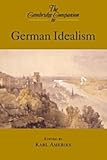The Cambridge companion to German idealism / edited by Karl Ameriks
Material type: TextSeries: Cambridge companions to philosophyPublication details: Cambridge, U.K. ; New York : Cambridge University Press, 2000Description: xiii, 306 pages : illustrations ; 24 cmISBN:
TextSeries: Cambridge companions to philosophyPublication details: Cambridge, U.K. ; New York : Cambridge University Press, 2000Description: xiii, 306 pages : illustrations ; 24 cmISBN: - 0521651786
- 9780521651783
- 0521656958
- 9780521656955
- 9780511999888
- 0511999887
- German idealism
- ARCH YNDC 193 A512C 23
- B2745 .C36 2000
| Item type | Current library | Collection | Call number | Status | Date due | Barcode | |
|---|---|---|---|---|---|---|---|
 Archives
Archives
|
SAIACS Archives Room | Yandell Collection | ARCH YNDC 193 A512C (Browse shelf(Opens below)) | Not for loan | 062874 |
Includes bibliographical references (pages 282-299) and index
Introduction : interpreting German Idealism / Karl Ameriks -- The Enlightenment and idealism / Frederick Beiser -- Absolute idealism and the rejection of Kantian dualism / Paul Guyer -- Kant's practical philosophy / Allen W. Wood -- The aesthetic holism of Hamann, Herder, and Schiller / Daniel O. Dahlstrom -- All or nothing : systematicity and nihilism in Jacobi, Reinhold, and Maimon / Paul Franks -- The early philosophy of Fichte and Schelling / Rolf-Peter Horstmann -- Hölderlin and Novalis / Charles Larmore -- Hegel's Phenomenology and Logic : an overview / Terry Pinkard -- Hegel's practical philosophy : the realization of freedom / Robert Pippin -- German realism : the self-limitation of idealist thinking in Fichte, Schelling, and Schopenhauer / Günter Zöller -- Politics and the New Mythology : the turn to Late Romanticism / Dieter Sturma -- German Idealism and the arts / Andrew Bowie -- The legacy of idealism in the philosophy of Feuerbach, Marx, and Kierkegaard / Karl Ameriks
The Cambridge Companion to German Idealism, first published in 2000, offers a comprehensive, penetrating and informative guide to what is regarded as the classical period of German philosophy. Kant, Fichte, Hegel and Schelling are all discussed in detail, together with a number of their contemporaries, such as Hölderlin and Schleiermacher, whose influence was considerable but whose work is less well known in the English-speaking world. The essays in the volume trace and explore the unifying themes of German Idealism, and discuss their relationship to Romanticism, the Enlightenment, and the culture of seventeenth- and eighteenth-century Europe. The result is an illuminating overview of a rich and complex philosophical movement, and will appeal to a wide range of readers in philosophy, German studies, theology, literature, and the history of ideas
There are no comments on this title.

